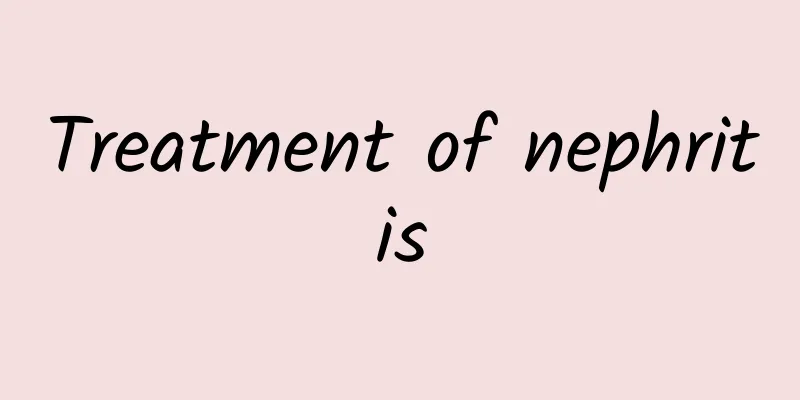Treatment of nephritis

|
There are many common diseases in life. In the treatment of diseases, the choice of methods is very critical. Different diseases are treated differently, and the symptoms and causes of diseases are also very different. Nephritis is a very common disease. Such a disease is very harmful to human health. If nephritis is not treated in time, it will become more serious and will cause other kidney diseases. What are the treatments for nephritis? When nephritis occurs, pain is the main symptom and patients will have obvious feelings. So what are the treatments for nephritis? There are many good treatments, and the most common treatment is drug therapy. + Treatment of nephritis: 1. Treatment of edema: Patients with nephritis with mild edema do not need treatment and it will disappear after salt restriction and rest. Patients with obvious edema can be treated with medication, and intermittent use is generally better than continuous use. 2. Bed rest: Bed rest is very important for acute nephritis. After the edema subsides, blood pressure drops, and urine abnormalities are alleviated, the patient can take a moderate walk and gradually increase some light activities, but do not increase the amount of activity suddenly. 3. Anti-infection treatment: Patients with nephritis in the acute stage should be given adequate anti-infection treatment if there is an infection focus. If there is no infection focus, it is generally appropriate not to use it. 4. Treatment of hypertension and heart failure: Nephritis patients with hypertension need routine treatment for hypertension. For patients with nephritis and heart failure, since patients with acute nephritis have high blood volume problems in the early stages, the focus of treatment should be on clearing water and sodium retention and reducing blood volume. 5. Diet and water: The amount of water intake is determined by the urine volume, edema, degree of hypertension and the presence or absence of heart failure. For patients with nephritis in the acute stage, it is advisable to limit water intake, but not excessively. In cases of obvious edema and hypertension, salt intake can be limited to about 2g/d. Protein intake depends on the indicator restrictions, and it is best to use high-quality protein, such as eggs, milk, lean meat, etc. It is generally recommended to continue a low-protein, high-sugar diet until diuresis begins. After the symptoms of nephritis are basically relieved, the patient can resume a normal diet. Through the above introduction, we have a good understanding of the treatment methods of nephritis, so when treating such diseases, we can choose the above methods. However, it should be noted that when treating this type of disease, patients should choose food, and it is best to eat less high-protein, high-fat, and high-calorie foods. |
<<: The most effective way to treat constipation
Recommend
Why does my toothache last for a month and still hurt?
The word "foodie" has become popular in...
Which department should I go to for hyperthyroidism checkup?
Which department should I go to for hyperthyroidi...
How to treat constant sore throat?
Getting angry is a problem that everyone will enc...
How does Traditional Chinese Medicine treat bronchiectasis?
Bronchiectasis is a common respiratory disease in...
What should I do if I feel uncomfortable in my stomach after taking anti-inflammatory drugs after curettage?
Diagnostic curettage. Many people may not be very...
The waist suddenly hurt and it healed immediately
Because of work, many people sit in the office fo...
When is the best time to treat retinal detachment?
For retinal detachment, scientific treatment must...
These four Chinese patent medicines are the most effective for clearing heat and removing dampness
Clearing away heat and removing dampness is the t...
What causes lower back pain after drinking?
Alcohol is very common in real life, and nowadays...
Thigh numbness while sleeping
It is very common to experience numbness in the t...
The efficacy, function and edible method of Zanthoxylum bungeanum leaves
Peppercorn is a common condiment in our daily lif...
The sound of sneezing
In daily life, sneezing is a very normal phenomen...
My breasts itch and red spots appear when I scratch them. What's going on?
If your breasts itch and red spots appear when yo...
Symptoms of varicose veins in the lower legs
Varicose veins in the lower legs are a common and...
What are the symptoms of Yangwei
Impotence is a relatively common sexual dysfuncti...









